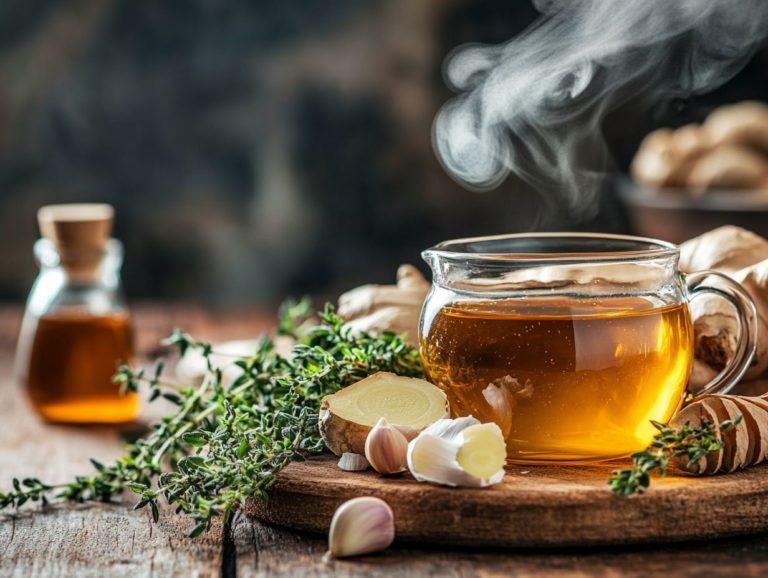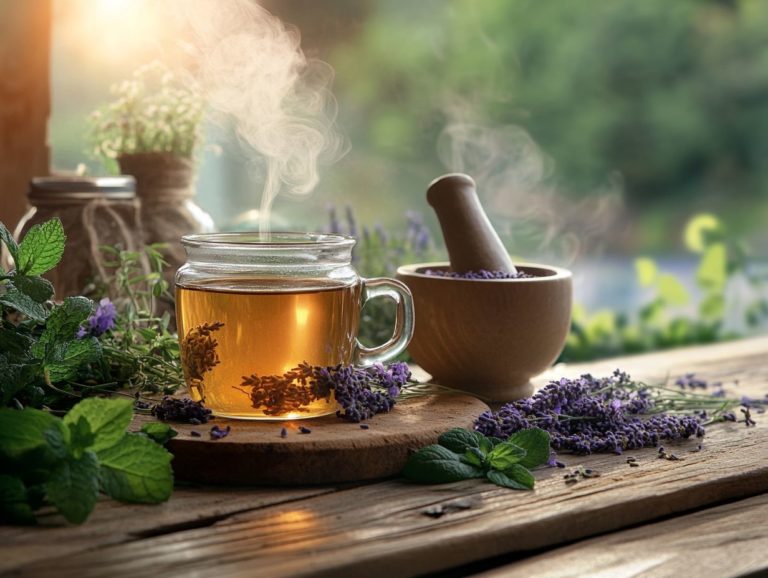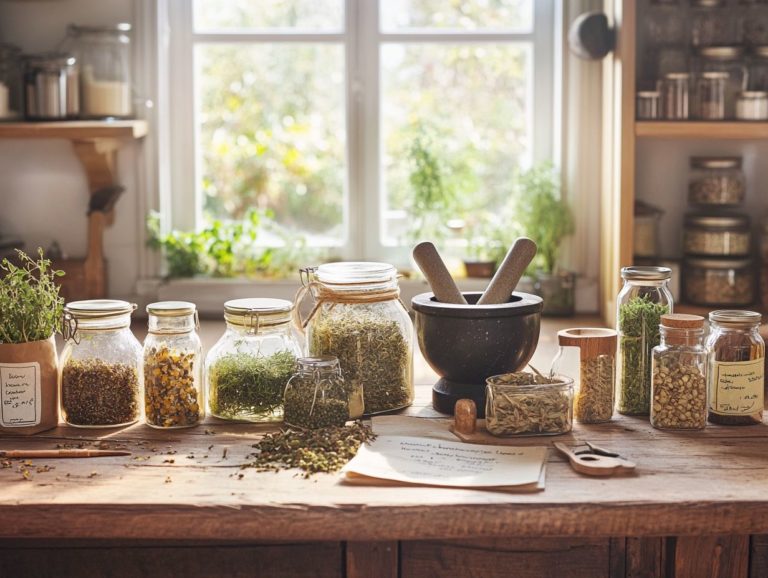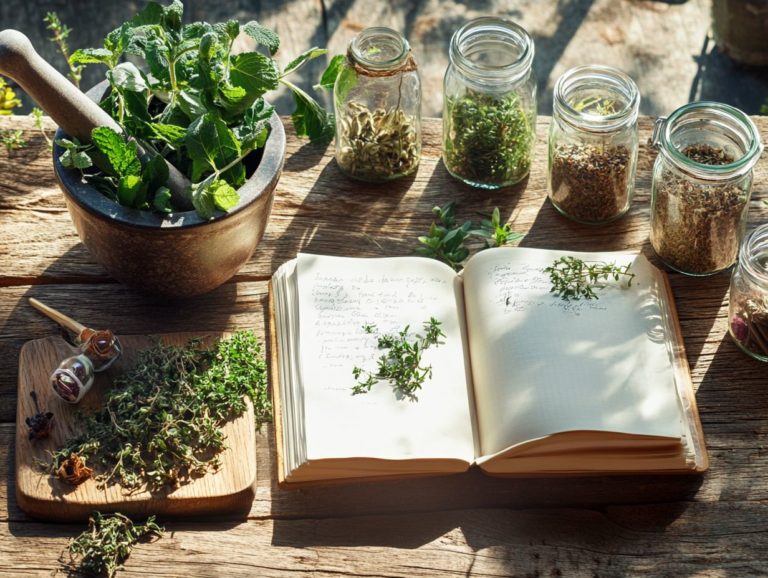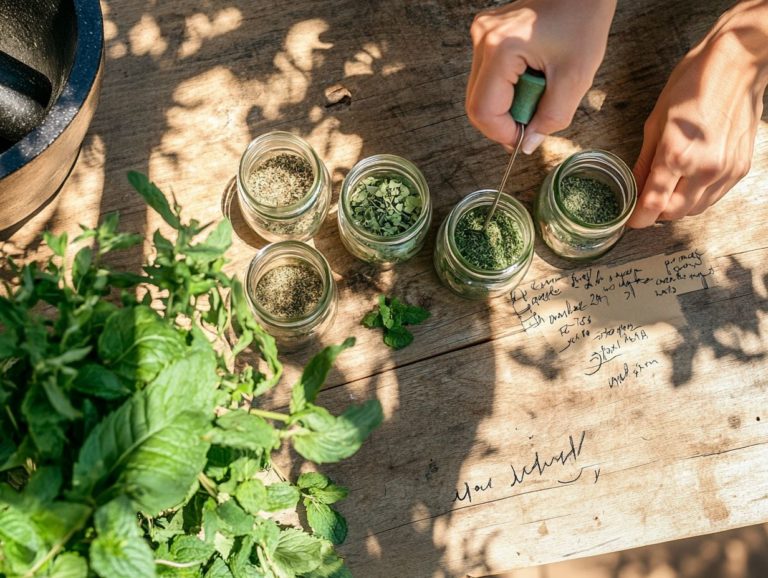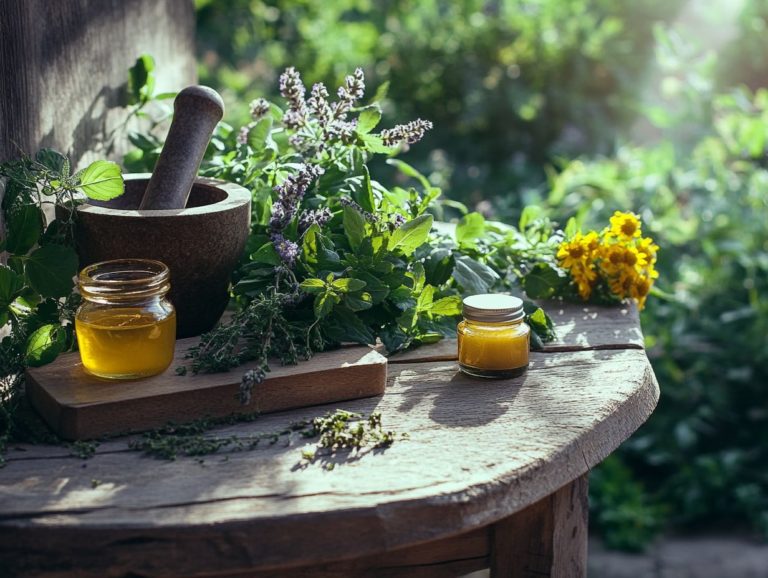Making Herbal Remedies: What You Need to Know
Herbal remedies have stood the test of time, providing natural solutions for a wide range of health concerns. This includes the use of herbs such as Echinacea and lavender.
This article invites you to explore the fascinating world of herbal remedies. We will start from a foundational understanding of what they are and the various forms they can take, including herbal teas and tinctures.
Get ready to discover the exciting benefits of creating your own herbal remedies at home! You’ll learn how to save money and tailor remedies to your specific health needs.
We ll highlight popular herbs, focusing on their medicinal properties. Plus, we ll offer practical guidance on crafting your own herbal remedies while addressing essential safety considerations.
Dive in and unlock the amazing healing potential of herbal medicine today!
Contents
- Key Takeaways:
- Understanding Herbal Remedies
- Types of Herbal Remedies
- Benefits of Making Your Own Herbal Remedies
- Common Herbs and Their Uses
- How to Make Herbal Remedies at Home
- Step-by-Step Guide
- Important Considerations for Safety and Effectiveness
- Proper Dosage and Storage in Herbal Remedies
- Frequently Asked Questions
- What are herbal remedies and their medicinal uses?
- What do I need to know before making herbal remedies?
- What supplies do I need to make herbal remedies?
- Can anyone make herbal remedies?
- Are there any potential risks or side effects of using herbal remedies?
- What are some common herbal remedies and their uses?
Key Takeaways:
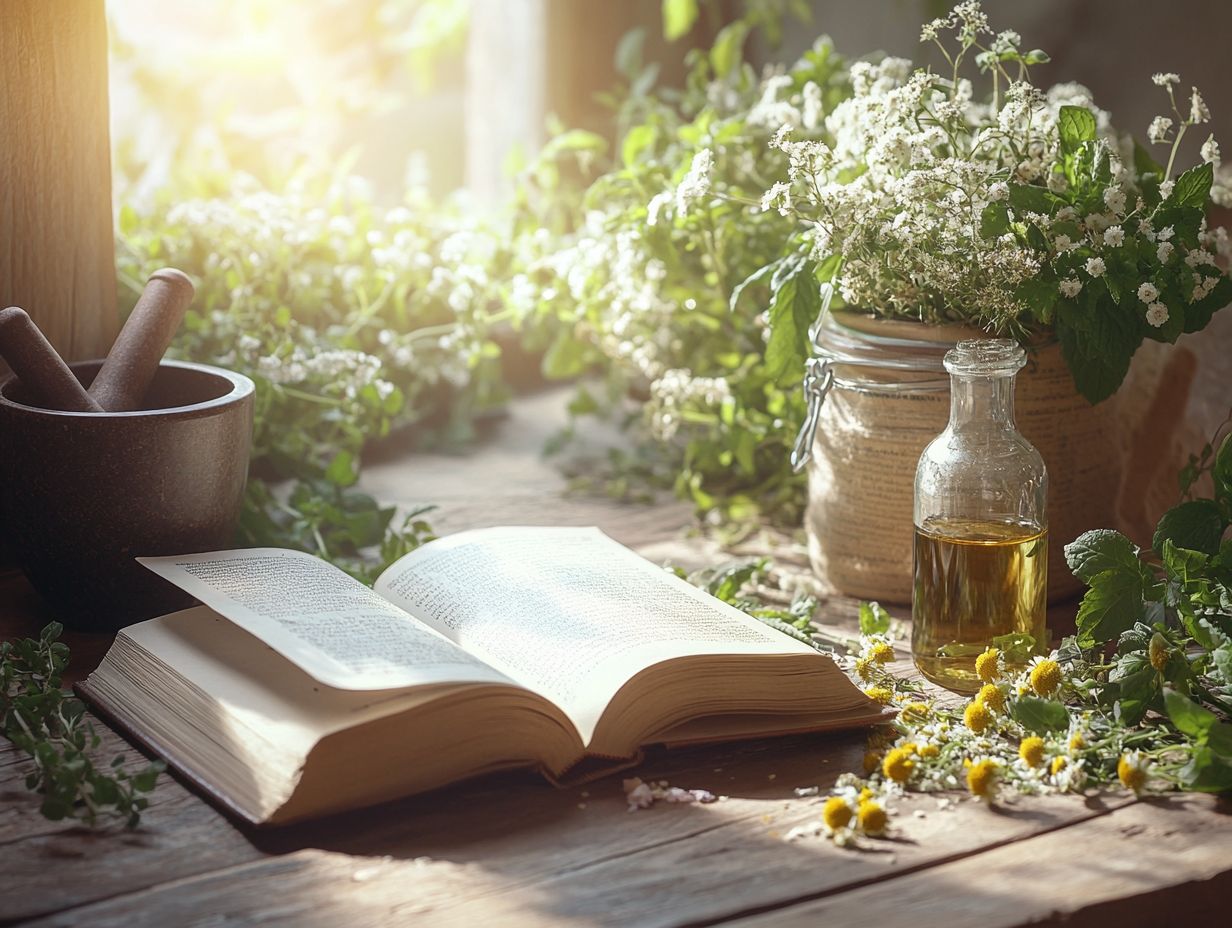
- Discover the world of herbal remedies and their many uses for healing and wellness.
- Save money and tailor your remedies to your specific needs by making them at home.
- Ensure safety and effectiveness by following proper dosage and storage guidelines for herbal remedies.
Understanding Herbal Remedies
Understanding herbal remedies invites you to explore the rich history of herbal medicine. This practice has thrived across cultures for centuries, pursuing health and wellness.
These natural remedies tap into the medicinal properties of various plant parts, offering solutions for a wide range of health concerns. They may also benefit your immune system and skin health.
From the time-honored traditions of folk medicine to modern herbal therapies, the effectiveness of these products is gaining validation. Rigorous scientific research is revealing how effective herbal treatments can be.
What are Herbal Remedies?
Herbal remedies are your natural allies, derived from a rich tapestry of medicinal plants. These plants have been trusted for centuries to enhance health and wellness.
They tackle different health issues head-on through their remarkable healing properties. These remedies come in various forms, including herbal tinctures, concentrated extracts, and soothing teas.
Each form is carefully made to help your body absorb the good stuff in plants. The intricate composition of herbal products features a diverse range of active ingredients, such as alkaloids, terpenes, and flavonoids.
While the use of herbal treatments is often steeped in tradition, it’s essential to prioritize herbal safety. Stay aware of potential interactions to ensure these nature-based solutions are effective and safe for your well-being.
Types of Herbal Remedies
Herbal remedies come in a rich variety of forms, such as herbal teas, tinctures, extracts, and supplements. Each is crafted to preserve the medicinal qualities of the herbs involved.
From the soothing embrace of chamomile to the refreshing lift of peppermint, grasping these diverse forms is crucial for effective use in health and wellness.
Herbs, Teas, Tinctures, and More
Herbs, teas, tinctures, and extracts are essential components of herbal remedies. Each harnesses the plant’s healing properties to enhance your health and wellness.
As you explore the realm of herbal applications, including traditional Chinese medicine practices, you’ll discover the fascinating ways these forms vary in preparation and effectiveness.
Teas, typically brewed from dried leaves or flowers, offer a gentle infusion of vitality, beloved for soothing digestive troubles. Tinctures capture the potent essence of herbs through an alcohol extraction process, providing a convenient option for quick relief.
Herbal extracts deliver concentrated doses of active ingredients, ensuring every drop offers a powerful therapeutic impact. By understanding these various forms of herbal remedies, you can choose the right option tailored to your unique health needs and preferences.
Benefits of Making Your Own Herbal Remedies
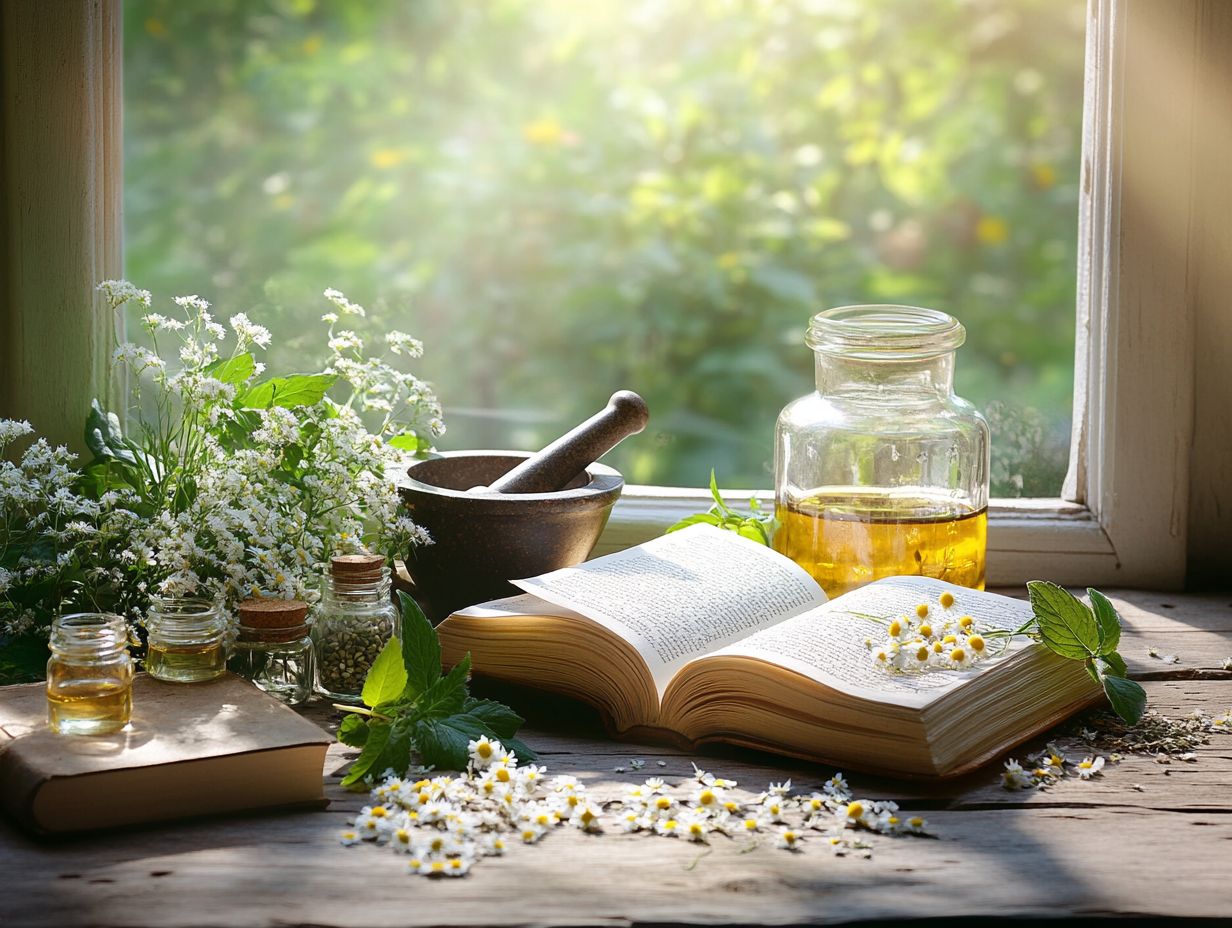
Making your own herbal remedies has many benefits.
You save money and create customized solutions that suit your health needs, fostering a deeper connection to natural healing.
By growing your own herbs and exploring their health benefits, you can craft solutions that align with your wellness goals.
Cost Savings and Customization
Creating your own herbal remedies helps you save money and tailor them to meet your health needs.
By crafting these remedies at home, you avoid the steep markups often found in retail products, which may include fillers and artificial ingredients.
This DIY approach helps you understand your body and its unique responses to different herbs while promoting mindful selection.
In addition to saving money, making your own remedies allows you to effectively address health issues whether it s anxiety, digestive troubles, or seasonal allergies by picking ingredients based on your experiences and preferences.
Pay attention to the safety and proper dosage of herbs, along with the quality of the raw materials you choose.
Choosing organic and ethically harvested herbs can enhance the effectiveness of your remedies, ensuring they fit your health goals.
Common Herbs and Their Uses
Common herbs like Echinacea, lavender, peppermint, and garlic have distinctive health benefits that have been valued for centuries.
These herbs form the foundation of countless remedies, showcasing nature s ability to promote well-being and vitality.
Overview of Popular Herbs and Their Health Benefits
Exploring popular herbs reveals their unique health benefits, such as Echinacea for immune support, lavender for stress relief, and garlic for heart health.
These remarkable plants have been cherished across cultures for centuries, playing integral roles in traditional medicine and still widely used today.
Echinacea is a favorite among Native American tribes for its immune-boosting properties and potential to reduce inflammation.
Lavender has graced ancient Roman baths, known for its soothing aroma that promotes relaxation and better sleep.
Garlic, with roots in ancient Egypt, is recognized as a natural antibiotic that supports heart health by lowering blood pressure and cholesterol levels.
Always remain mindful of safety; for example, if you re on blood thinners, consult a healthcare provider before increasing your garlic intake.
Generally, these herbs can be easily added to your daily routine through teas, tinctures, or supplements, allowing you to enjoy their impressive health benefits.
How to Make Herbal Remedies at Home
Crafting herbal remedies at home is a truly exciting adventure!
Imagine the satisfaction of preparing herbal teas, tinctures, and extracts from various medicinal plants to unlock their remarkable health benefits.
Embracing this practice not only enhances your wellness but also deepens your connection to nature and its healing properties.
Step-by-Step Guide
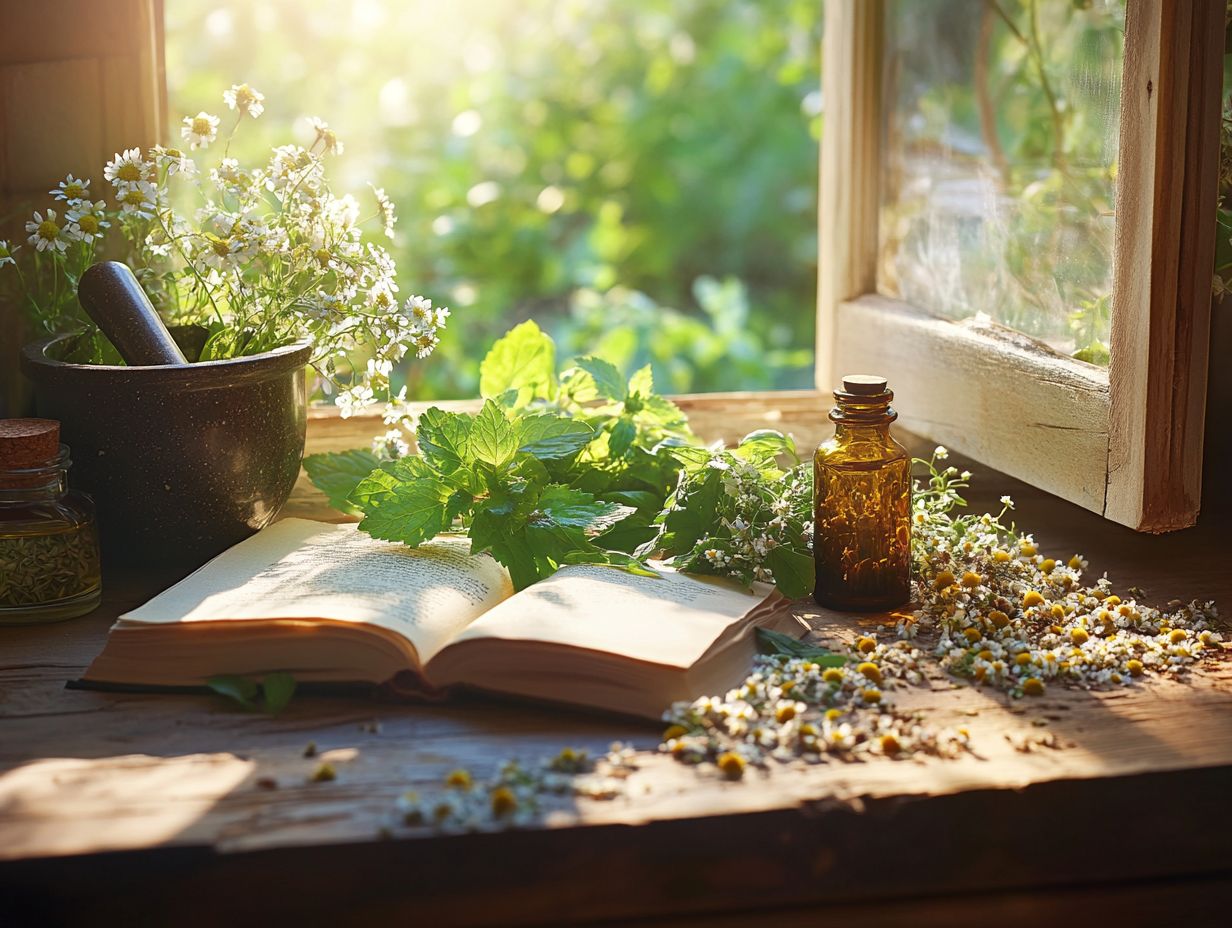
Follow this step-by-step guide to master the art of creating your own herbal remedies. Start by selecting the right herbs, then dive into preparation methods such as teas, tinctures, and extracts.
On your journey toward natural wellness, it s essential to recognize the unique properties of each herb. Some pack a powerful punch, while others are on the milder side. Once you ve chosen your herbs, take the time to familiarize yourself with the best preparation techniques to unlock their full potential.
For example, crafting your own herbal remedies at home includes making a soothing herbal tea, which calls for precise measurements of dried leaves. Tinctures, which are concentrated herbal extracts made by soaking herbs in alcohol or vinegar, require special handling to draw out beneficial compounds.
Adhering to recommended dosages ensures safety and effectiveness, so don t overlook this crucial step. Storing your herbs correctly is crucial! Keep them in a cool, dark place to maintain their potency.
Consider cultivating your own herbal garden. Having fresh ingredients at your fingertips can significantly enhance the quality of your remedies.
Important Considerations for Safety and Effectiveness
When it comes to the safety and effectiveness of herbal remedies, it’s essential to consider a few key factors. Focus on herbal sourcing and quality assurance. You’ll want to understand the appropriate herbal dosage, be aware of any potential interactions, and ensure the quality of the herbs you choose.
By paying attention to these aspects, you can maximize the health benefits and embrace a complete approach to wellness.
Proper Dosage and Storage in Herbal Remedies
Understanding the proper dosage and storage techniques is essential for you to maximize the effectiveness and safety of herbal treatments while ensuring their quality over time for optimal health benefits.
By carefully adhering to recommended dosages, you can enjoy the intended benefits of these natural products without the risk of unintended side effects. For example, herbs like echinacea and valerian come with specific dosage guidelines that vary based on your age and health status. It s vital to follow these recommendations, not only for your well-being but also to foster effective practices in herbalism, which encompasses herbal education and practices.
Proper storage is equally important. Keeping your herbs in a cool, dry place away from direct sunlight can significantly influence their potency. Storing extracts in dark glass containers further safeguards their integrity, allowing you to fully enjoy the benefits of high-quality herbal remedies.
Frequently Asked Questions
What are herbal remedies and their medicinal uses?
Herbal remedies are natural treatments made from plants or herbs used to prevent or treat various ailments, including digestive and skin health.
What do I need to know before making herbal remedies?
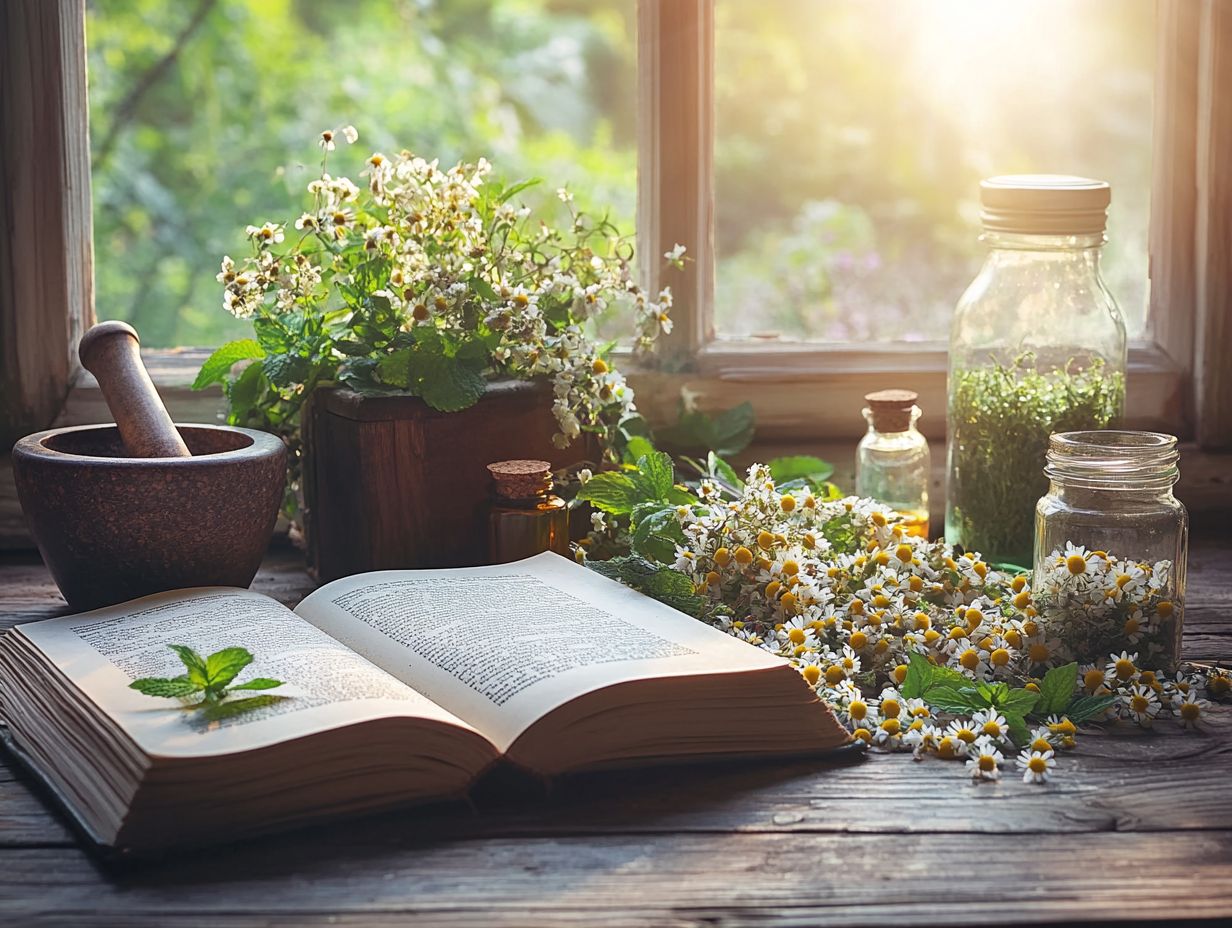
It is important to research and understand the potential benefits and risks associated with the herbs and ingredients you plan to use. Consulting with a healthcare professional before incorporating herbal remedies into your health routine is also advisable, especially when considering dietary supplements and herbal tinctures.
What supplies do I need to make herbal remedies?
The supplies needed may vary depending on the type of remedy you are making. Common supplies include herbs, jars or bottles, essential oils, a strainer, and carrier oils such as coconut or olive oil.
Can anyone make herbal remedies?
While herbal remedies can be made at home, they require effective knowledge of using herbs. It is important to understand the herbs and their potential interactions with other medications or health conditions. It is recommended to seek guidance from a trained herbalist or healthcare professional.
Are there any potential risks or side effects of using herbal remedies?
Like any other treatment, herbal remedies may have potential risks or side effects, including interactions with other medications. It’s essential to research and understand these risks and consult with a healthcare professional before using herbal remedies.
What are some common herbal remedies and their uses?
Some common herbal remedies include echinacea, which helps your body fight off illnesses, peppermint for your stomach’s well-being, and chamomile for stress relief. Ginger is also popular for easing nausea.
Dive into the fascinating world of herbal remedies! Make sure to understand the proper uses and potential risks before using any herbal remedy.

